 |
 |
 |
 |
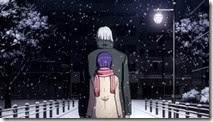 |
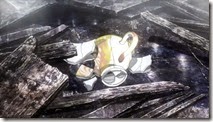 |
I don’t know what stunned me more – that final episode, or the reaction to it.
Author’s Note: Given the obvious gap between anime and manga events,
please refrain from posting manga spoilers in the comments even if the
anime has concluded. Many of us plan to read it in full later.
This feels like a fitting moment to me in so many ways. Fitting, because it seems rarer and rarer that I agree with the mainstream on anything anime-related. Fitting, because Tokyo Ghoul (all the more so “Root A”) has been all over the map. It’s a vexing, confusing, irritating, enigma of a show and it seems only right that it should end with such a spectacular disconnect – between the audience and the series, and between myself and most of the audience.
I hadn’t read a word of reaction to the finale when I watched it – watched it half a day later than normal due to RL commitments, as it happens. And my first comment (on Twitter) after it was over was “Whatever you may think of the story choices, that was one of the most artistically beautiful anime episodes ever.” Now it so happens that I liked the story choices, but I’ll get to that shortly. After I tweeted that I started reading some of the reaction in the usual places, and lo and behold – almost universal derision and snark. And initially, that shocked me.
Here’s what I don’t know: what the relationship of this ending to the manga is. I haven’t read it (not this far into it at least), and I know this season has been a strange dance with manga canon – lots of spins and dips, sometimes cheek-to-cheek and sometimes in a different room. This has clearly been a major source of trouble, a cause of much of the inconsistency that’s been the only consistent thing in “Root A”. I get the sense that there’s been an uneasy relationship between Ishida Sui and this adaptation – and maybe between he and director Morita Shuhei too, for all I know. One where Ishida was never quite sure how close to the printed word he wanted to steer, and his halting approach impacted Morita’s.
So, then, without knowing how close these events were to the source material, my sense in watching the finale was glorious liberation. For me as a viewer, and for Morita as a director. In watching it felt like Morita-sensei just said “fuck it” and rather than a conventional narrative, delivered an impressionist painting – the inherent tragedy that was always the strongest part of Tokyo Ghoul told mostly in silence and beautiful but terrible imagery. It may not have been what most fans of the manga wanted, but I thought it was inspired and powerful.
Morita’s artistic sense seemed liberated in every way, too. He’s clearly a massively talented director, and there have been moments of brilliance throughout the series despite the limited budget. But this final episode was practically one long master class on cinematography, lighting and scene blocking – panning shots, stunning use of light, incredible dissolves, and subtle misdirection. The drips of blood, presumed to be Kaneki’s, turning out to be Hide’s. Kaneki crying his eye clear with red tears. The glint of a broken shard of china in the snowy night. In terms of pure directorial flair – sound and vision as a tool to create art – it was as fine an anime episode as I’ve seen in a very long time.
And yet, the reaction. This dangerous territory for me to even venture into, sorely testing Mom’s advice about “If you can’t say…”. And yet I feel I have to at least comment on it, because it’s the elephant in the room. Why do most Tokyo Ghoul fans seem to hate this episode that I loved unreservedly? Is it because they’ve read the manga and I haven’t (nope, too simple)? Is it because Morita broke pretty much every rule in the book in making it? Is it because it delivers very little in the way of cookies to the viewer – not much resolution, not much explanation? Or is it just a matter of Morita making the right episode for the wrong audience?
I don’t know, of course – and if I dig any deeper, I’m only going to get myself into more trouble. But I will say this: I sure as hell hope Morita Shuei continues to work in TV anime, because he’s a huge talent. I’ll go back to that first comment, “Whatever you think of the story choices…” because I think if you get past that, it’s hard to deny that the episode itself was gorgeous. It had style overflowing from every frame, and grace too – it was quiet and melancholy, which is exactly what it should have been, considering the material.
Here’s the hard truth – the Tokyo Ghoul manga is still ongoing. Even if “Root A” had followed it literally we wouldn’t have gotten a real ending. And the mistakes of the first 11 episodes (mostly the first six) weren’t going to be rectified in one finale. So Morita stripped the story of Tokyo Ghoul down to its essence – he captured perfectly what makes this a powerful premise, and quietly mused on it for 22 minutes. This is a stupid, senseless cycle of death and revenge, and this latest chapter “Raid at Anteiku” is the most pointless waste of all. No one wins here – good people die, bad people die, but the killing goes on and on and there seems no way to stop it. And Ken is caught exquisitely, perfectly in the middle – as Morita literally showed us with some incredible imagery based on his appearance. It was a far, far better way to end this series than I ever thought was possible.
So then, we don’t know whether Yoshimura is alive or dead, or Shinohara for that matter. We don’t know what happened when Ken silently delivered Hide’s body to the CCG, and Arima confronted him (and for that matter, we know next to nothing about Arima at all). I get why folks are disappointed by that, and by the general sense that so much of “Root A” was B-side material and wasted time. What did we really learn from Ken’s time with Aogiri – which took him off-screen for most of the season? Why were so many characters introduced with no context whatsoever?
Why, indeed – there’s no denying “Root A” was a mess. Whose fault was it? I don’t know, because I don’t know how much control Ishida asserted over the direction of the season. But I do know that at the very end the series redeemed itself, because Morita understands it at the molecular level. He gave us the truth of Tokyo Ghoul in this final episode unfettered by needless dialogue or by sound and fury. Finally. I’m sorry the anime wasn’t able to do justice to the story in the traditional narrative sense (though that battle, as I said, was lost before this episode ever started). But I’m also sorry so few viewers share my view that this episode, in the context of how the series built up to it, concluded the series in the best way it could possibly be concluded. It was a work of art by a director of vision, insight, and spectacular talent, and that this will be the lasting memory of the Tokyo Ghoul anime is the best outcome I could ever have hoped for.
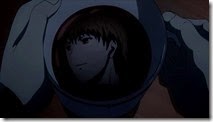 |
 |
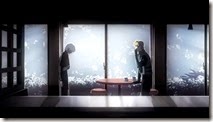 |
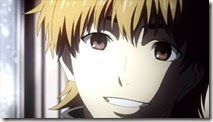 |
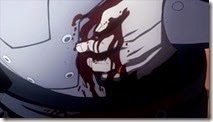 |
 |
 |
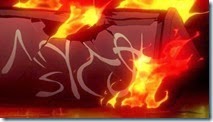 |
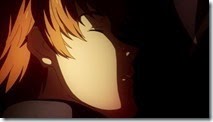 |
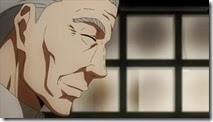 |
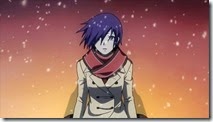 |
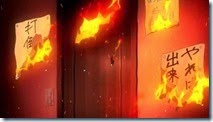 |
 |
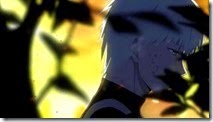 |
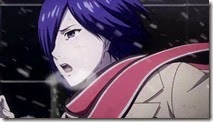 |
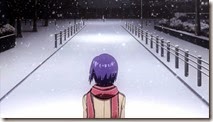 |
 |
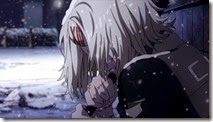 |
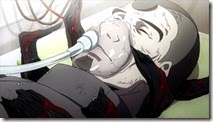 |
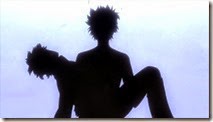 |
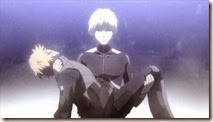 |
 |
 |
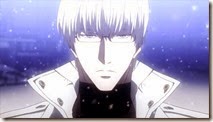 |
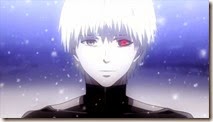 |
 |
 |
ED Sequence:
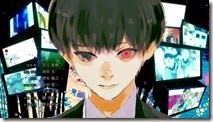 |
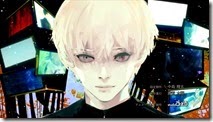 |
 |
Epilogue:
 |
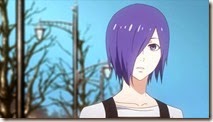 |
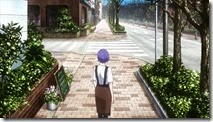 |


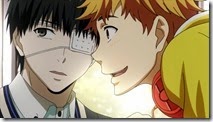
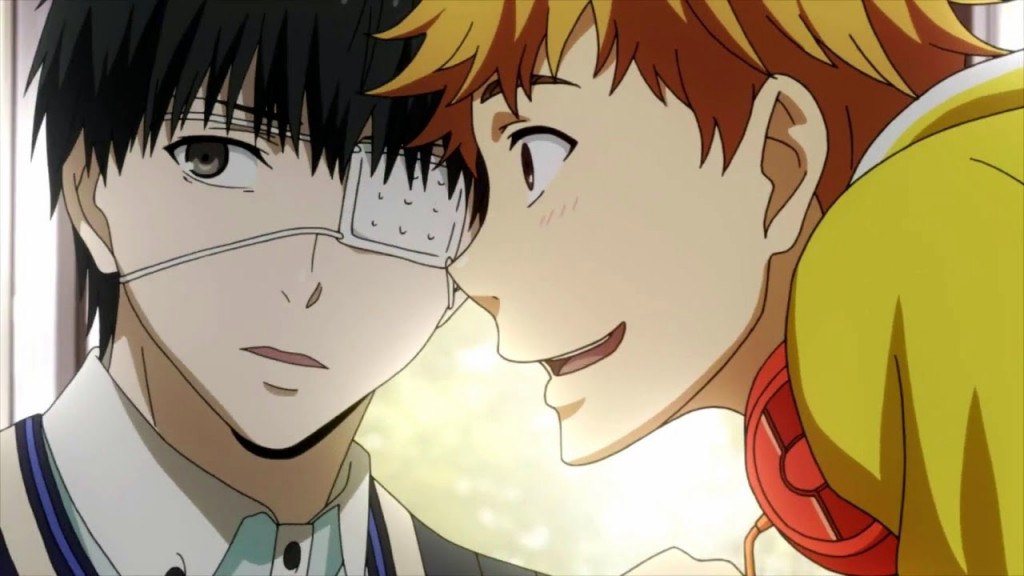
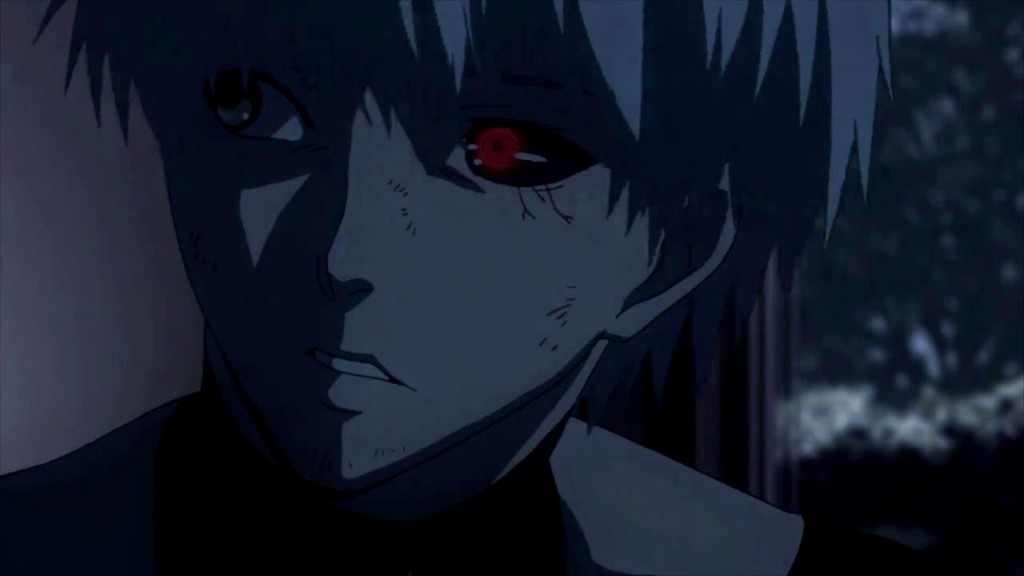
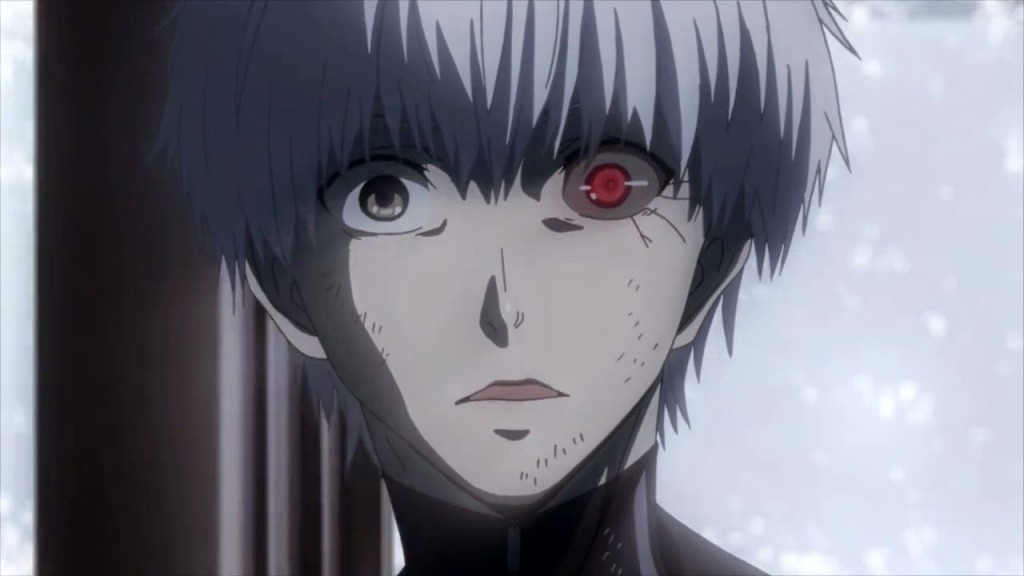
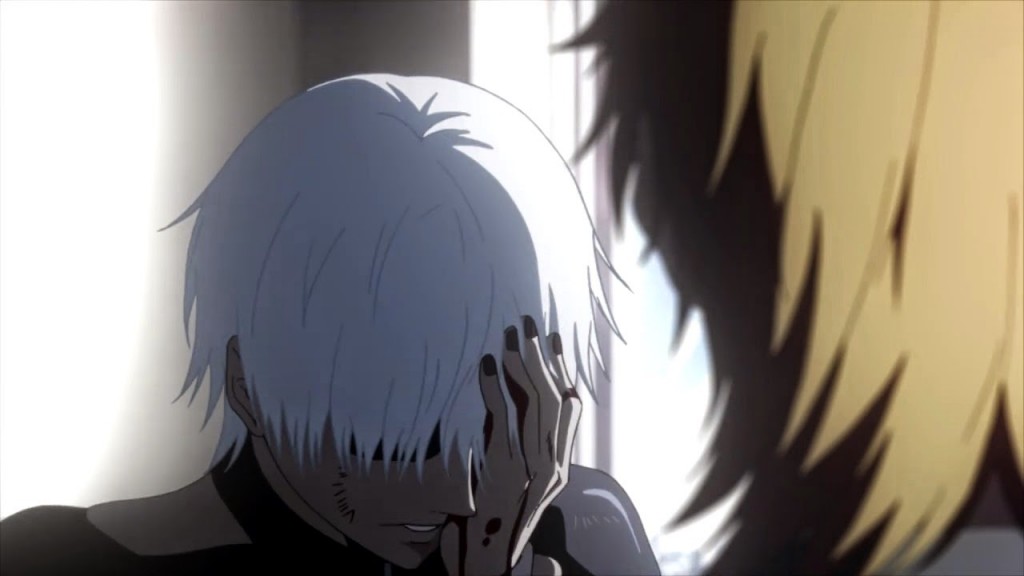
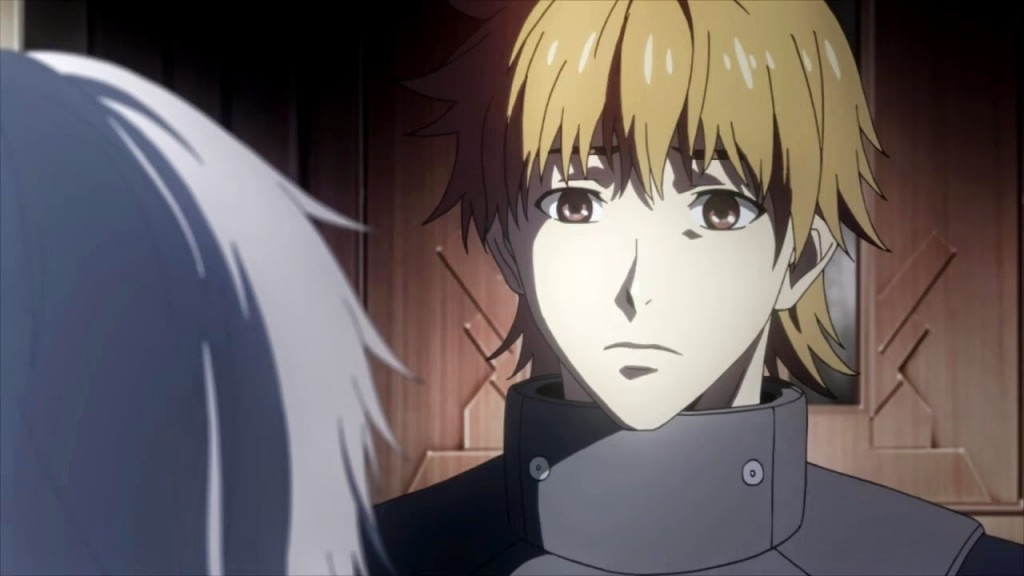
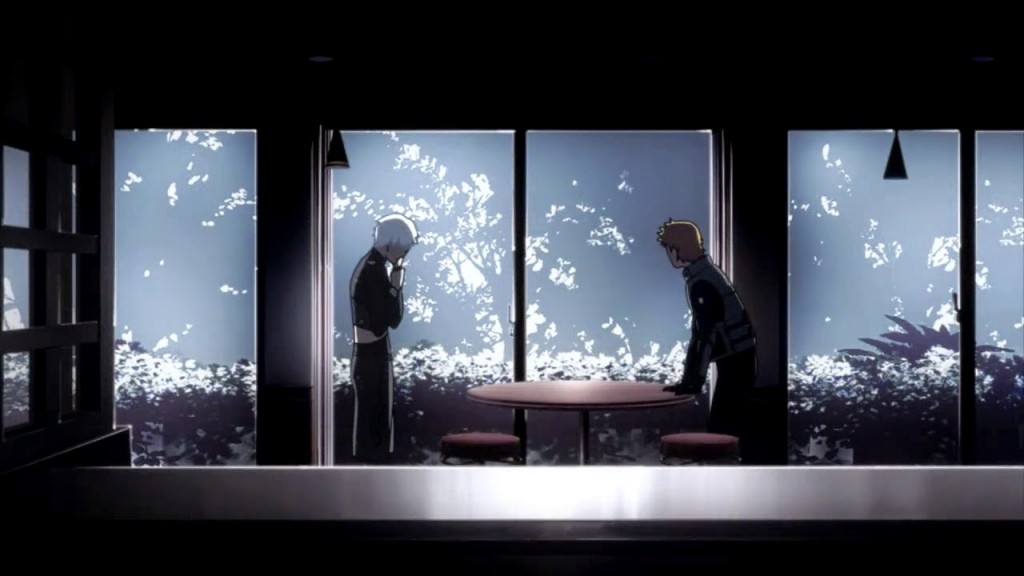
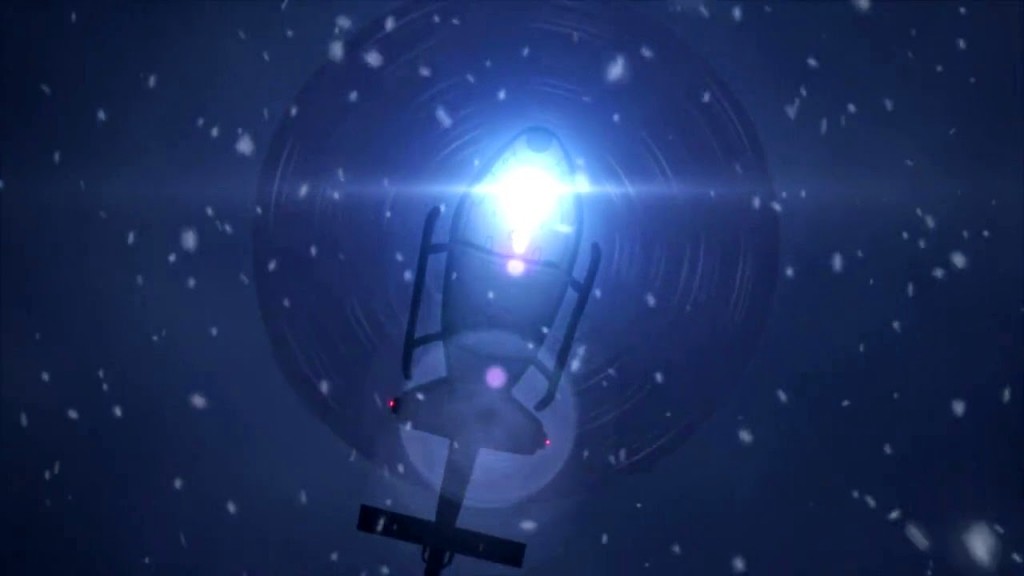
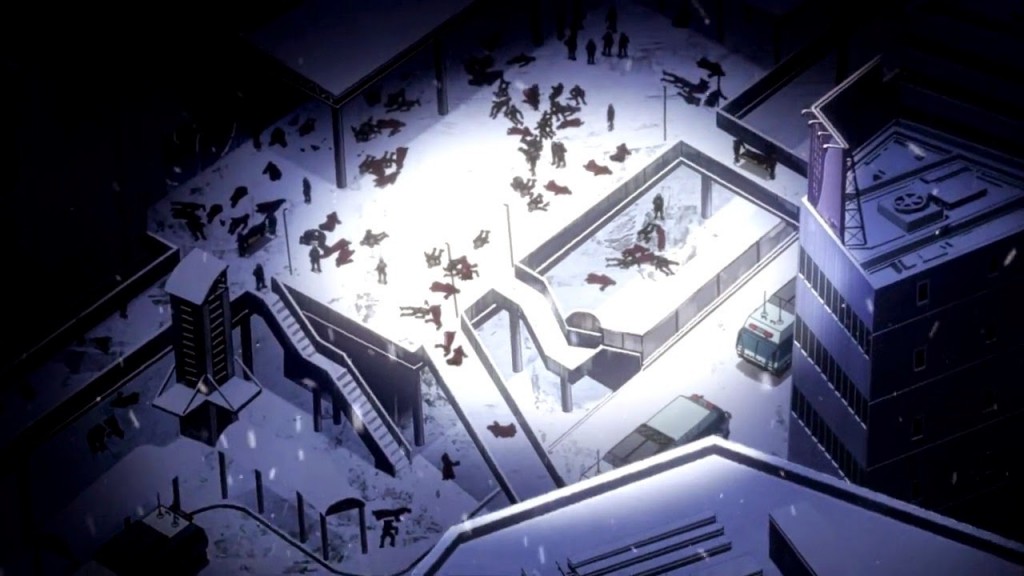
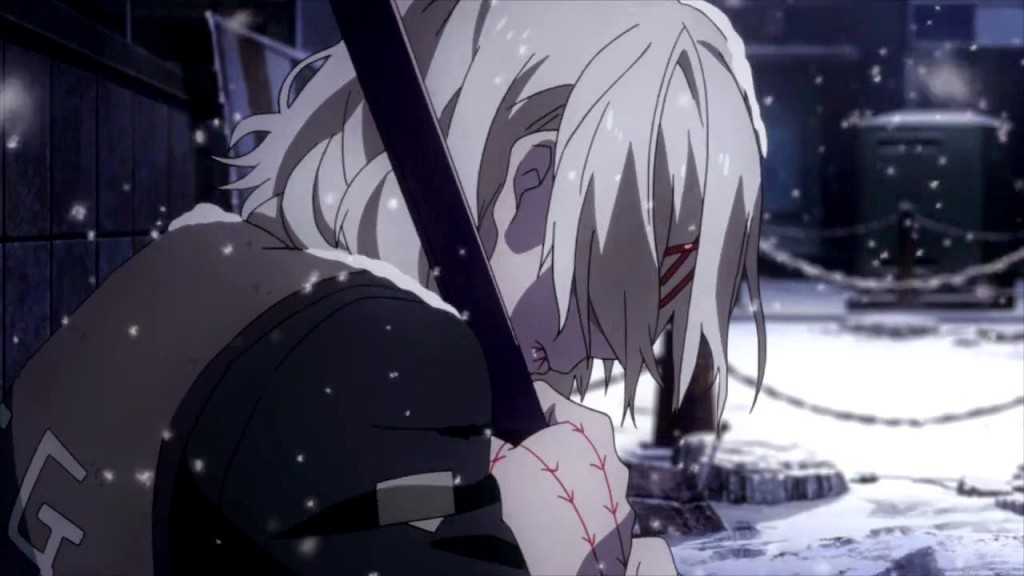


Dee
March 27, 2015 at 2:58 pmI'll stand next to you in defense of this finale. (I'm a fellow anime-only viewer, for what that's worth.) Tense, beautiful, quietly, wrenchingly tragic – the best anime episode since Space Dandy's "World with No Sadness" this summer. It punched tears out of me and left me actually gasping when the end credits suddenly rolled, cutting through the silence like a gunshot.
Looking back over the series, it was certainly messy plot-wise, and while I sort of understand the stuff with Aogiri, it WAS pretty badly truncated, and their sudden disappearance from the story made their early actions seem somewhat pointless. But the series made up for it with some excellent direction, music, character beats, and moments of melancholy introspection. Overall, I think the series was a success, if not a flawed one, and this finale (much like the first season's finale) made it all work a lot better than it probably should have.
admin
March 27, 2015 at 3:06 pmRarely have I so disagreed with the Zeitgeist. And I disagree a lot.
In a sense, it's not that surprising. It's like TG fans went to a screening and a Monet broke out.
Dee
March 27, 2015 at 8:50 pmI admit I didn't notice much of a pushback on my own feed, but then I mostly only follow other anibloggers. It's a difficult ending that doesn't offer any easy answers and is a pretty significant rejection of the standard "superpowered boy takes on the bad guys and saves his friends" ending, so I guess if you hadn't picked up on the tragic undercurrent, this would feel like an unsatisfying ending. Granted, I'm not sure *how* you couldn't have picked up on that, but (outside of the "it wasn't a beat-for-beat retelling of the manga" crowd) that's the best explanation I can offer for why so many people hated it.
Earthling Zing
March 27, 2015 at 3:09 pmTokyo Ghoul just doesn't want to end conventionally does it?
As a non-manga reader I found it kind of funny how the point most manga readers made about why they hated the episode was that they didn't show an Arima vs Kaneki fight.
I also found it hilarious that, being the last episode, the director found it appropriate to go all artsy on us. It didn't quite work so well because I found it quite difficult to appreciate without much investment in the characters but quite a lot of things were surprising: Hide's death and excellent framing, Kaneki's end(I think???), and the the episode's final note, Touka moving on and starting her own cafe(the most satisfying resolution the episode delivered on).
If Tokyo Ghoul had spent more time with its characters pondering over the issues that matter, this episode might have been enjoyable, but after just watching Parasyte before(which admittedly was a lot more direct), the episode just didn't click for me.
sonicsenryaku
March 27, 2015 at 3:32 pmI agree wholeheartedly in regards to tokyo ghoul root A's mesy structure interfering with the viewer's ability to resonate with the characters and scenarios but isolating this ep and judging it purely on story-telling, execution, and direction; it's in a class of its own. To be honest, i had hopes that this season wouldnt be messy when it was annouced that it would be an original route but as we are all aware, it pretty much just ended up being an iffy manga adaptation (which attributed to yet another rushed product) to people's dismay including myself (although im disappointed for different reasons). It becomes clear that the more i look into the tokyo ghoul anime that had it not been so restricted from a production standpoint (im not clear who's fault it is) we would have gotten a enriching anime that would be remembered for a long ass time
sonicsenryaku
March 27, 2015 at 3:25 pmoh morita please dont stop directing anime…..just….dont…stop. When he has full control he is a master stroke. Again, it always feels like (when it comes to tokyo ghoul) that something is holding him back and it's only in the season's final episode can he go "alrighty then….now let me do this my way". One of the things i really appreciate about this ep is how morita brings the whole idea of kaneki being the star of a play full circle. kaneki's stroll down the street with hide in his arms reflect that of him being on stage, walking towards the crowd and then the spotlight (the helicopter) shines upon him as the act closes. The play came to an end, and kaneki played his role as the tragic protagonist splendidly. That last light that shone upon was the part where the audience should have applauded for his performance.
Ultimately, as the episode came to a close, I got the impression that the goal of this episode was to actually teach touka what it means to pull yourself through heavy loss. She witnessed her "safe haven" burn to the ground, and then saw the person she really cared head into the abyss of death. Like Yoshimura, she lost the things that kept her going in life and like him, she has opened a coffee shop with the hopes that people can come together and be happy. Yoshimura, through his trials and tirbulations, learned that when life becomes tragic you have to crawl through the filth and come clean on the other side. Perhaps in some way, Yoshimura wanted touka to be his successor which is why he asked Yomo to help her learn this lesson. She has dragged herself through this tragedy that is this story of ghouls vs humans; and through her loss, like yoshimura, she has found the strength to persevere. She truly is the only character that got a sort of happy ending, and ultimately stayed on the right path. I thought this episode illustrated touka coming to learn this life-changing lesson so beautifully. This final ep was right on par with the finale of season one in my eyes in terms of how it handled the prominent themes of the narrative; i thought this ep was amazing.
admin
March 27, 2015 at 3:51 pmGreat "all the world's a stage" point – wish I'd thought of it.
sonicsenryaku
March 27, 2015 at 5:18 pmthanks; while i was watching the ep and experiencing morita's vision i just had this moment when i saw what he was trying to do. I was reminded of hide and touka's conversation in the earlier eps when Kaneki was in the helicopter spotlight and i was like "holy shit, that was brilliantly executed, i cant believe he actually brought that point back full circle"
elianthos80
March 27, 2015 at 4:27 pmIn terms of visuals – from the snow and the black/white/scarlet palette to some celebrated sculptures and paintings (the Veiled Christ marble sculpture in Cappella Sansevero in Naples https://en.wikipedia.org/wiki/Veiled_Christ#/media/File:Cristo_velato.jpg + Stefano Maderno's Santa Cecilia marble sculpture https://en.wikipedia.org/wiki/Stefano_Maderno#/media/File:St_Cecilia%27s_Martyrdom.jpg + Kaneki carrying Hide in very much the traditional Virgin and Christ Pietà fashion, just from the top of my head ) and direction it's a fantastic episode . It had a poetic, somber yet moving – elegiac? – quality.
Even if I ended up watching only the early episodes of Tokyo Ghoul – the earlier anime I mean. It lost me around the Gourmet appearance – hence basically had little to no no investment or knowledge about most of the characters appearing in this finale it still managed to engage me emotionally. The themes and mood were palpable, while it featured the three characters and relationship(s) that I remembered had sparked my interest at the beginning of the series: Ken, Hide, Touka. And once more the themes of identity, loss, reaching out, points of understanding (and lack thereof) with their problematic ramifications – this is shaping up to be quite the week for anime watchers isn't it? -.
dangerly
March 27, 2015 at 5:10 pmI've read the manga and kept up with the anime since the beginning – and I've gotta agree with you on this one. Indeed, what happened in this episode was very different from the ending of the manga, but for the theme it was shooting for, and how we were seeing Kaneki develop here; I couldn't help but be moved – helped amazingly by that immaculate directing. Of course, largely like the first season, I think people were feeling somewhat bamboozled by the fact that many of the plot threads that were building up had never come to fruition, and that many of the scenes and character appearances, without their proper conclusions (or even introductions), made them ultimately pointless. This series undoubtedly had a problem of composition and even possible creative conflicts of interest, which is a shame. Like you said, I think the biggest limiting factor was budget, and the fact that the writers didn't know how much of this should have been straight adaption or not.
Regardless of its flaws (of which there are plenty), I share the sentiment that this series was worthwhile; Ishida's directorial prowess makes it worth the price of admission alone, and for every moment of dullness and/or confusion, there's another with powerful introspection, gravitas, and even catharsis. Few anime in recent memory did such a good job, in my opinion, of establishing a mood (in this case, aching melancholy) so well.
As for the people complaining, on the other end, I can also sympathize somewhat. There's certainly more action and blood at the end of TG, but I think the most peculiar thing was how different it turned out for Ken as a character (one reason this last episode I think made Root A worthwhile). While I won't say a :re adaption would be impossible to work off of from Root A, I don't know how well it would work out on several varying levels. But man, I would still recommend checking it out – it's powerful in its own right, and certainly left a huge aura of controversy in its wake when it ended, for what that's worth.
dangerly
March 27, 2015 at 5:18 pmForgive me, I'm running on fumes here – I meant Morita, for the directing. My brain is fried from sleep-deprivation.
chiakimagoto
March 27, 2015 at 5:29 pmlike you Enzo, i thought it was beautiful………….and actually watched it 2 times………….i'll look into the manga later.
vincee87
March 27, 2015 at 6:28 pmAbsolutely agree with your review of the finale Enzo. I loved the visual and presentation of this episode. I'd like to add that the audio complemented the visuals beautifully too. Playing the piano version of the first season's OP Unravel was brilliant (I've always loved the lyrics on that song).
Plot-wise, since I'm a manga reader, I'm disappointed but I'm not going to go there because that horse is long dead.
And as always, thank you for blogging the show. Always a pleasure to read your thoughts.
Btw, did you go for Anime Japan 2015 last week? Don't think I saw a post on it.
admin
March 28, 2015 at 12:44 amToo far away now that I'm in Kansai.
Yes, the music and sound design were also fantastic.
kandda92
March 27, 2015 at 8:07 pmOh man this episode was very beautifully directed,props to that,also liked how it's subtly hinted Ayato saved Touka. The ending is basically the same(an open ending) yet Morita improved on the manga ending by focusing on what makes Tokyo Ghoul's story great. As a manga reader I knew Root A might not be as satisfying as the manga, however being prepared for that, I still enjoyed a great deal out of it. Usually when an anime follows an anime original storyline, it get's criticized a lot,usually for the story being inferior to the manga storyline, however there are exceptions of course where it's a huge improvement. TG Root A is somewhere in between, so many things could've been better executed(if there were more episodes possible), Kaneki joining Aogiri didn't really lead to anything. I respect Morita for delivering a imperfect yet improved version of TG, that by many, from the start, was doomed to fail.
Btw Enzo, Kuroshitsuji Book of Murder OVA 2 is out if you haven't seen it already.
Chrysostomus
March 27, 2015 at 9:42 pmMost manga readers like myself hated it because it was essentially:
a) nothing happens: the ending
b) it was so freaking out of character for Kaneki to go "welp, time to commit suicide now!" What the hell was that? He would never do that.
It almost feels wrong to say "out of character" given that he had barely any character in Root A. Admittedly, the first manga does end without answering lots of important questions, but it does so because what happens at the end marks a very clear turning point in the story. Here in Root A we never even got to know WHY Kaneki joined Aogiri in the first place. Aogiri was mostly a non-factor. The anime could have been a vehicle to explore the top Aogiri heads but nope, it just introduced all the basic new characters (without rhyme nor reason, like for example, introducing Kuro and Shiro makes no freaking sense if they're not gonna show Dr. Kanou at all) and cut down their development.
Perhaps the ending could have packed a great emotional punch if the rest of the series had been, well, good. To me it just looks like a lazy, budget-saving way to end the show.
Then you have things like Touka running around aimlessly for three episodes and being useless, especially in this one. It really irritates me that for all her running she just can't catch up to a guy who's slowly walking. These are the great "divergences from the manga" which we were promised, but in the end it amounts to the same thing as in the manga Touka doesn't go to the Anteiku Raid and thus stays out of the whole affair.
But oh look Kaneki's hair is black again except it's not wow such deep symbolism. The manga has the whole "the Fool's Journey" tarot thing going on which is pretty cool, but such subtleties were lost in this very poorly thought-out mess.
Raggers
March 27, 2015 at 10:10 pmArtistically this was no question a beautiful episode, much like the first season's finale. But if you look deeper what we effectively have is Kaneki committing suicide after 23 eps of trying to become stronger to save the people around him. One goes and he gives up? That's poor form.
And in the end I appreciate the anime and manga are different, but the anime completely misses the manga. At its core the manga is gritty and stark; a real world with so many players manoeuvring. And a tragic handful of characters are trying to carve some sort of sense and structure into this world, knowing all too well any success will be temporary, that compromises will be necessary to get close to the peaceful life they want. And they know in the end this pursuit will break them, but they cannot let go without losing themselves in the maelstrom of darkness that is Tokyo's underworld.
Guardian Enzo, I would strongly encourage you to read the manga and, maybe, even write about it. Having watched the anime you would no doubt pick up on the little things – much of the idle chatter in the manga actually foreshadows things yet to come. This serious was planned meticulously almost from conception and boy does it show. The quality of the storyline is comparable to shows like Game of Thrones, and it uses its much smaller cast of characters to develop nearly every one of them.
If you like dark fantasy then Tokyo Ghoul is, I would say, a showcase example of how to do truly dark fantasy. A brilliant storyline where everything makes sense, utilising and developing all characters effectively while keeping a dark, brooding atmosphere to create a hauntingly real tragedy.
admin
March 28, 2015 at 12:47 amWell, that pretty much saves me any need to read the manga…
Raggers
March 28, 2015 at 1:07 amDon't say that! I knew how it was going to end but it didn't affect my enjoyment in the slightest… in an odd way it may have heightened my appreciation that this was, in fact, not a shounen and more a tragedy.
Also, there are lots of other plot points (never in the anime) that carry over to Tokyo Ghoul Re: in quite surprising ways.
And since Sui Ishida seems to know very well what is happening, I would conjecture that Tokyo Ghoul is just Act 1 of a (not quite epic) tale.
lHyDrAl
March 28, 2015 at 1:21 amThe episodes Morita himself directs stick out like a sore thumb. Episodes 1 and 12 from the first season and this episode are so far above the rest that it's actually quite glaring. To quote user juungi from MAL, "This series is essentially what you would expect to be the end product of 12 directors and script writers playing telephone together with each episode," and I absolutely agree with this assessment. I don't know whether to pin the blame on Morita's inexperience as an overall director, or the staff Pierrot provided him, but either way both seasons, and especially this one had a huge disconnect between the quality of the episodes, with Morita seemingly the only one with any semblance of an understanding of what Tokyo Ghoul is supposed to feel like atmospherically. Overall, the first season, while skipping a fair share of the manga, manages to adequately adapt the introductory chapters of the manga, but Root A completely fails in this regard. Despite my praises of Morita himself, while the episode was a hit directionally and visually, the actual content was a fail, but looking at everything that came before it, I guess it's the best Morita could have hoped for. I can only hope the ending of the episode isn't an indicator of future plans with the manga at Pierrot, because this clearly isn't a property that Pierrot has treated with respect, especially when compared to other adaptations they have had success with. All in all, I recommend to anyone and everyone to read the manga from the first chapter to experience one of manga's modern masterpieces, one that Ishida Sui has crafted from the very first chapter to the last with extreme care and ingenuity and continues to do so in RE.
admin
March 28, 2015 at 1:27 amBecause this adaptation is so un-Pierrot like – sweeping changes isn't their M.O. – I wonder if a lot of this didn't come from Ishida himself. As if he saw the anime as a grand experiment to free-associate something he never tried in the manga.
In any event, my sense is that Ishida's involvement in the anime was a bane to Morita. I do want to see him direct his own material, but if he'd been given the task of doing a straight-up adaption of the manga I've no doubt it would have worked fine. Rather, it seems as if he was handed an impossible task and as a result, we see all the continuity issues and "telephone" syndrome. It feels as if the finale is the first time Morita was true to his aesthetic in directing Tokyo Ghoul
maverickmann84
March 28, 2015 at 1:26 amI didn't have too much of an issue with the ending. It was undeniably artistic and poetic in many ways, and a great episode taken individually. The manga (before the TG RE: series started) ended in a similar way, but without any of the good aspects, so it wasn't much of a shocker. Also at the end of the ep you see Tohka with a sign saying RE: on it implying some sort of sequel that will cover the new series. If you take the manga ending as a preplanned jump to the RE: series it isn't quite as bad, but it was still sloppy and contrived. My beef with the manga is fixed in many ways in the anime. Instead of characters inexplicably dying off-screen without any explanation (major characters who deserved a lot better) you get to see most of the major deaths play out. It was certainly lacking from a conclusive story standpoint (part of that likely due to the desire to animate TG RE:) but maybe bc it fixed some of the issues from the manga, or maybe bc I was expecting it after having read the manga, I didn't mind the way it ended. It could've had a much more thorough conclusion, but it was still a great episode overall. Though lets face it Arima is literally the worst thing to happen to both the manga and the anime. He has no business being the one to finish off so many significant characters after having essentially no time spent even introducing him properly. Hopefully they animate RE and it fixes the problems. Maybe he was out of ideas for TG and decided it needed a revamp, maybe he's just a lazy, disrespectful, and overall shitty author only the continuation will prove one way or another.
MedicMario
March 28, 2015 at 1:55 am"Show don't tell."
Film, television, and of course anime as mediums rely on imagery to tell a story. I'm not a critic, I don't tend to analyze the narrative of a series and try to decipher the meaning behind it. I do however pay attention to the themes of stories that play out on the screen before me.
That being said since the first episode of the first season, humanity has been appeared to have a been a theme throughout this story. With this episode I feel it comes full circle.
Coming back to the "show don't tell," as Enzo pointed out, this episode is largely silent, letting the imagery tell the story. This finale let me watch the story unfold, not hear it. It allowed me to put my own meaning to this story. For that reason, this is one of my favorite finales of all time.
noodles
March 28, 2015 at 9:09 amI hope no one spoils you for TG :RE. Pls read the entire series from chapter 1, it's not perfect but its definitely flows better than the anime, Perhaps, if the entire anime was directed like episode 12 of both seasons, this would have been a masterpiece.
Rhegz Point of View
March 28, 2015 at 3:00 pmFinally.. someone who shares the same views as me.. if I were to describe this finale episode it was so beautiful and yet its so tragic. I was shocked when I saw the biggest turning point of the story. I dripping blood was actually from Hide. My tears starts to fall when his legs starts to weaken. I was watching this whole show with my mouth open and sobbing. The most beautiful part was when Kaneki silently carried Hide's lifeless body on that snowy road full of dead bodies with ccg soldiers cant even make a move and just watching him passing. And TK's saddest and most beautiful version of Unravel give justice to that beautiful scene. Ugh!!! I wanna have that version on my playlist now!!! Im not so disappointed on the outcome unlike those people who complain nonstop about this ending. I've read the whole manga okay. Both Tokyo Ghoul, TG:Re, and TG:Jack and I know that this TG√A will have an unusual plot (the element of manga is there but in different interpretation). Still this is one of the most breathtaking finale in anime so far (for me okay).
eladnhoj
March 28, 2015 at 4:05 pmA lot of what I feel has been stated in the post and by many comments, but I just want to point out that the use of "shaky cam" in this episode (especially in the scene where Touka falls on her knees) was glorious. It gave me goosebumps all over.
melodic thoughts
April 5, 2015 at 1:11 pmA little late on commenting but here goes:
I do love Morita-sensei's directing, the plot just do not live up to it. I do agree that this episode too was a really good one, but a large part of that goes to Hide-kun, and I was happily surprised they managed to come together (in a way it sort of wraps up Tokyo Ghoul by taking things back to the very beginning, to their friendship). There is also that beautiful scene of Kaneki carrying Hide-kun and just walking, while the camera pans silently on his face looking front and sideways, his faint expressions speaking multitudes.
Even with that beautiful cinematography, I still feel a little empty. The second season didn't seem to address anything that significant (that season one didn't already), the emotional impact was not high on a whole. I did not even care that Amon is dead… I'm not sure if that is what most TG fans are angry with, and that that is what made them unable to come with gripes with the entire adaptation. Personally, I would rather this second season did not exist, even if it meant I would not be able to see Morita-sensei's wonderful work on this.
Jasper
April 6, 2015 at 8:32 pmI adored that ending so much. It completely exceeded expectations. I find it somewhat amusing, the unabashed way in which they dropped Eto / Owl's storyline and ended both the Amon/Akira and Juuzou/Shinohara lines by just killing those characters and leaving the others grieving and traumatized. (Actually, that's how the main storyline was resolved too, aheh.) Especially since I was getting irritated by the repeated cop-out fake deaths.
That slow walk reminded me a lot of Bastion, though different in key ways. I really appreciated them showing the grieving and trauma of a lot of faceless CCG agents – a kind of nod (though maybe a hypocritical one) to the endless slaughter of faceless characters in shounen media. And the ~ambiguous fate of Kaneki. That suitcase click was beautiful.
Although it makes me wonder whether Arima's sole purpose was to be a ruffly white-haired character so that ending screen was possible.
I didn't expect the post-ED scene either, although it's pretty conventional (ZnT comes to mind). Lovely ending.